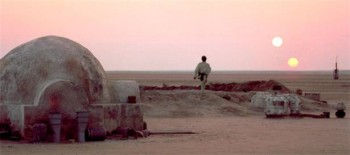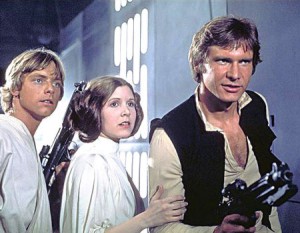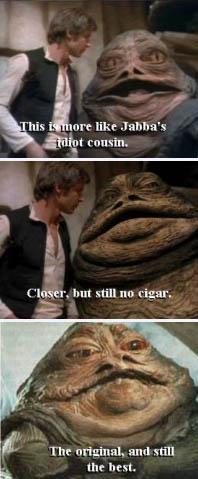|
It would almost seem that at this point, thirty years after its release, there would be nothing new anybody could possibly have to say about Star Wars. And furthermore, I'm not going to pretend that I do have any fascinating new insights. However, I feel that it must have some mention here on my site, for it is without a doubt the film that made the most profound impression on me out of all of my years, and so here it goes. It was 1977, I was eight years old, and up on the screen, instead of some crap like Herbie Goes Bananas, there was this spaceship streaking past that looked like it was a trillion miles long. That was it. Before the film reached its very first cut, I was sold. 
These days, when new records are constantly being set for biggest opening weekend and such, it's hard to appreciate or communicate just how gigantic the impact of Star Wars truly was, much in the way I suspect my mother has always felt when trying to convey to anyone in the generations behind her just how the Beatles totally reshaped the landscape of popular culture. The very concept of the "blockbuster opening" was started by this little film that nobody had any faith in, this throwback to a lost era of fluffy adventure film serials that was for some reason having the temerity to try and reemerge in the midst of a very bitter and cynical time to which it clearly did not belong. That was before, of course. Almost from the moment it came out, Star Wars owned the '70s, and its presence continues to be felt to this day, if never quite so strongly as in the years following its initial release. 
In a period of the industry when effects-laden films are pretty much the norm, it's also hard to get a feel for just how stunning the images were to an audience who had seen almost nothing of such quality before; only 2001 managed such smooth visuals, but even it lacked the variety and the flat-out speed. Indeed, everything looked so amazing and new that it was almost an effortless act to miss just how new the storyline wasn't. The hero's journey is one of the oldest stories in human history, but not only was the presentation new, it was, to put it simply, weird. In contrast to how it seemed at the time, today the film feels quite slow and languid. After the gripping opening featuring spaceships and laser gun battles, the film moves on from the one human character of Princess Leia and her capture at the hands of the Empire-who, as personified by masked, armored men, might well have been robots for all we knew at the time-the film proceeded, with true art-film aplomb, to deliberately alienate its audience. For fifteen or twenty minutes, we move on to following a pair of androids (or simply 'droids, as they came to be known), only one of which looked vaguely human or could even speak, as they bumbled around lost in the desert. Eventually they are captured by glowing-eyes critters who don't speak English and are tossed into a giant space Winnebago with a bunch of other non-human-looking robots who also failed to speak English. In 1977, there were doubtlessly many members of the audience who sincerely were beginning to wonder just what the fuck it was they were watching at this point, before Luke at last showed up and gave them something to ground themselves with. Much has been said in subsequent years about the "used universe" look of the film, but at the time, it was a fact that this simple and yet obvious conceit was one of the most effective ways in which one was able to transcend the unfamiliarity of the specifics in this universe and easily grasp the story world as one where people actually lived and went about their business, as opposed to gliding around artificial, emotionally-distancing sets and fabrications. In all ways, Star Wars got right in your face. The editing was fast. The gunfire was loud. The spaceships went flying by with a scream. A whole freaking planet exploded, for crying out loud. And the whole story felt comfortably and instantly familiar. As a total package, it's a terribly strong film in both concept and execution. So immersive and involving was the tapestry that it was possible to completely miss the fact that the big, After the unexpected and enormous success of the first film, it was almost inevitable that additional ones would be forthcoming; while Star Wars had functioned well enough as a stand-alone adventure, there were oddities in its structure that had hinted at more to come: an Emperor was mentioned but never seen or defeated, Luke received his father's old weapon, which he never used, and the villain got clean away. Ultimately spawning two sequels and three prequel films, as well as an ungodly number of spin-off novels and comics which I've avoided entirely, Star Wars set its roots deeply into the landscape in a way which feels, at least to our narrow view of time, to be quite permanent. 
In 1997, for the twentieth anniversary and in preparation for the then-upcoming prequel trilogy, writer-director George Lucas decided to readdress several points of personal dissatisfaction with the first three films, and especially this, the original, which resulted in the theatrical release of the Special Edition versions of the films (which were then tweaked slightly again for the eventual DVD release). About one-second's worth of these alterations included the infamous and rampantly over-discussed "Greedo shoots first" scene. So much bitching and fury accompanied this admittedly annoying change that it led to a rather unfair castigation of the Special Editions as a whole, as if that single second of added action had blinded most everyone to the fact that the vast majority of the alterations genuinely were improvements, from eliminating matte lines and improving compositing to breathing life into alien beasts of burden who previously had stood stock still. Spaceships now move more dynamically, Ben Kenobi's lightsaber no longer blinks off, and a few lines which had actually been present in the original theatrical release but which had been mysteriously missing from all but the laserdisc releases were re-instated. The most significant alteration was the re-instatement of a confrontation between Han Solo and gangster Jabba the Hutt, which would probably have been better off left on the cutting-room floor. Had the scene been in the film from the get-go, it likely would've played fine, but after deciding initially to cut it, all the pertinent info in the scene was moved to the earlier Greedo scene, and Jabba's personality changed to a more sinister one by the time he finally showed up in Return of the Jedi. (It also doesn't help that the so far two attempts at restoring this scene have failed to create a CG creature that actually looks like the Jabba we all know and love.) I could ramble on forever-really, I could-and still not fully communicate the degree to which this film was important not only to the industry, but to myself personally. It's not the best film ever made; there are many films with better direction and acting and, well, I think everyone knows that George Lucas doesn't have the greatest gift for dialogue. But he does have a keen eye for visuals, a great sense of story and an editorial approach that is superbly strong and complementary to his documentarian shooting style. More than any before or since, Star Wars is the film that made me care the most not only about movies, but about the making of movies, and I expect it will endure throughout film history for a good while to come.
-review by Matt Murray
|
|
||||||||